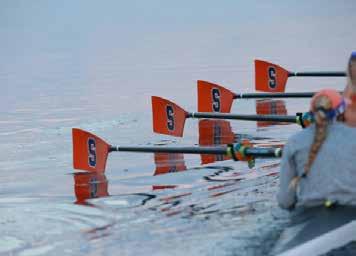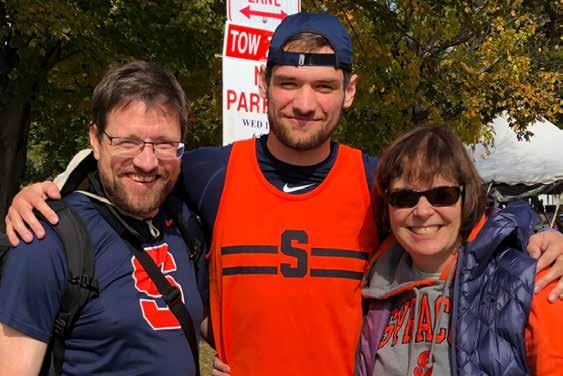
12 minute read
Learning Resilience
This past fall, the Syracuse Women’s Rowing team was fortunate enough to train on the waters of the Onondaga Lake and Seneca River for six weeks, while some NCAA teams were prohibited from returning to their respective campuses. While the team recognizes how fortunate we are to have had the successful fall we did, it did not come without adversity.
Before we arrived in Syracuse, the team was broken up into four training “pods.” Each pod was created based off of living arrangements, and each coach was assigned a pod for the fall semester.
Advertisement
The first month on campus was a test of our patience as the team endured one month of individual training before official team practices could begin. Classes started in late August, and practices began in late September.
To protect our team from a potential cluster of COVID-19 cases, we had to limit our social circles to our “pod-mates.” We could still visit with teammates and friends outside of our pod, but we knew we had to stay vigilant in wearing our masks and with social distancing.
^ Freshman 4+ Cox Emma Dziedzic, Bow Mae Sweeney, 2 Julia Comerford, 3 Maddi Segarnick, Stroke Sarah Haney. There was too much at stake, and a slip-up could have been detrimental to our training efforts. The creation of the pods brought new friendships, virtual pod competitions, new workout-buddies, and bonds with our coaches. Many pods got together for “pod-luck dinners,” which proved to be a nice break from the stress and frustration of navigating COVID-19 on a college campus.
The first morning back at the Boathouse felt like Christmas morning. Everyone was smiling ear-to-ear underneath their masks, and I would argue that the positive energy that day was more contagious than any virus.
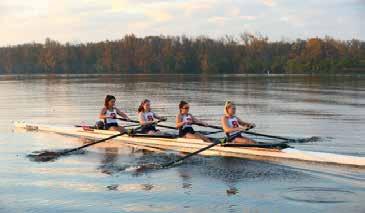
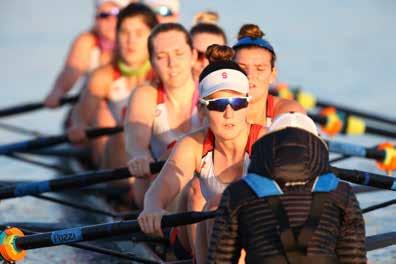
^ Stroke Ellen Pozzi leading her crew in practice pieces on Onondaga Lake.
Around mid-October, Syracuse University had a very low count of positive cases, allowing us to merge pods and put together new lineups on the water. After weeks of distancing, COVID tests, and a lot of work in small boats, being able to practice as a full team on the Onondaga Lake made it all worthwhile.
Our team learned resilience like we had never known before, which we will carry with us into our 2021 racing season. “In a year where so much has been unfamiliar and uncertain, rowing and training with teammates was one part of life that actually felt ‘normal’ this fall. Even the little things like grabbing a run with a teammate or two helped keep me from losing my mind in the craziness of online school. I’m extremely grateful for the opportunities we had, and looking forward to even more in the spring!” – Hannah Murphy ’23
“Training this fall took a toll on all of us. After missing the spring season, all any of us wanted was for rowing to be back to ‘normal.’ While that couldn’t have happened, I feel very grateful for the amount of water time we were able to have throughout the fall and it has shown how strong and resilient our team truly is.” – Grace Asch ’22
– Orange Oar Correspondent Louise C. Rath
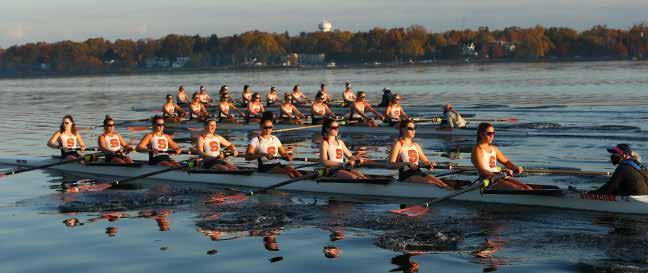
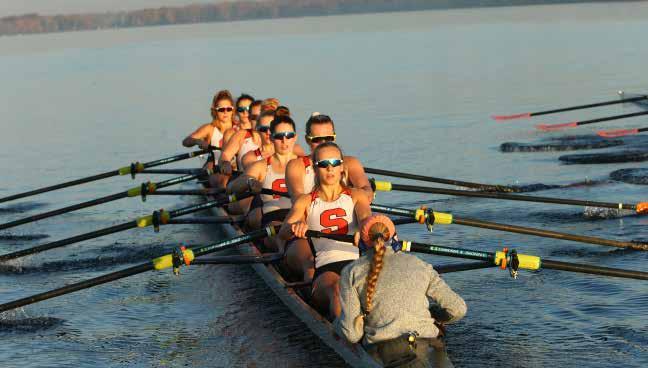
< Happy Australian Phoebe Robinson.
Below: Practices on Onondaga.
^ Bow Heather Stafford, 2 Junior Ognovich, 3 Maddi D’Ambra, 4 Eliza Yager, 5 Grace Asch, 6 Emma Gossman, 7 Christie Castorino, Stroke Liv Schaertl, Cox Julia Roach
> Mid-piece concentration: Bow Lily Moffly, 2 Haley Uliasz, 3 Emma Braun, 4 India Aikens, 5 Kate Ryan, 6 Lucy Pearce, 7 Helena O’Donnell, Stroke: Josie Kiesel, Cox Hannah Murphy.
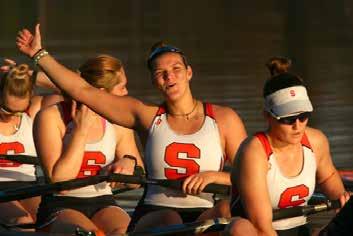
Looking Back, Moving Forward

On March 11, 2020, the women’s rowing program stopped practice. The NBA’s season was postponed indefinitely and Tom Hanks was the first celebrity to test positive for COVID-19.
Our world was permanently changed on March 11th. Our team did not travel to Clemson, South Carolina for spring training, the ACC and NCAA Championships were canceled and each teammate departed campus within 72 hours. Two months later, on May 25, 2020, a Minneapolis police officer knelt on the neck of George Floyd for 8 minutes and 46 seconds. Floyd’s violent murder was filmed and outrage sparked in cities around the United States. Our world has changed again, this time not because of a virus but a violent hate crime that forced Americans to challenge racism and American values.
Our team held a Zoom meeting to talk about the murder of George Floyd, COVID-19, and race. Every teammate and coach expressed feelings of sadness and a need for change; but more importantly we established a plan to find our identities, educate ourselves on race, and give back to the Syracuse community.
Syracuse Women’s Rowing has participated, and often led, a student community outreach group called Young Scholars. Young Scholars partners with the Boys and Girls Club of Syracuse to help Syracuse city students with homework through mentorship and games of pick-up basketball.

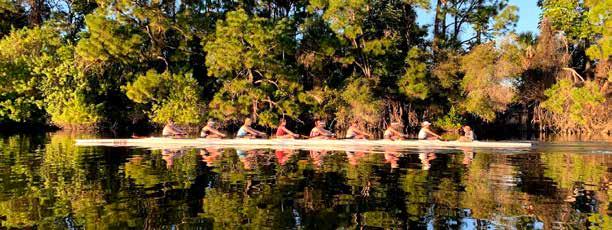
Three times a week after practice a group of girls from our team drive to the Boys and Girls club near campus. The rowers along with several other Syracuse University students and athletes spend about two hours helping the kids with homework, eating snacks, and introducing them to college life with games and conversation. Members of the Syracuse Women’s Rowing team have historically led the Young Scholars group, which is currently led by Grace Asch ’22. Young Scholars helped Syracuse Women’s Rowing build a bridge between the University and the Boys and Girls Club.
But as a team, we wanted to do more. Women’s Rowing Head Coach Luke McGee had an idea to create a group including representatives from each women’s rowing team in the Atlantic Coast Conference, women who are motivated to create change and diversify rowing within their school’s community. Senior Christie Castorino (SU 2021) and I represent Syracuse rowing in what’s called the ACC Unity Group.
ACC Unity meets once a month to plan and discuss events within our teams and communities that could introduce Black, Indigenous, Latino, Asian, and youth who may never see a boat, learn about rowing and how to row. Our short-term plans include educating our teams on politically correct terminology, and how to be anti-racist, as well as the indigenous history on the lands our schools stand on through books, movies and discussion. Long-term, we hope to introduce rowing and college to kids in the Boys and Girls Club of Syracuse. In addition to learning how we can create change as a team, leading up to the 2020 presidential election our team rallied around encouraging 100% of our eligible teammates to vote. We attended Zoom sessions about the importance of voting and educated ourselves on the elections within our hometown. No matter what side of the aisle we stand, our team was determined to get our voices heard through voting. After the election, we learned 100% of the women eligible to vote on our team had voted!
In 2020, we learned resilience and stood strong through countless challenges.
In 2021, we are preparing to return to campus, stronger than ever, and in search of a spot at in NCAA Championships. We are preparing to enter an unprecedented season. Last year our season was canceled due to the first wave of COVID-19.
The 2021 season will be different. As collegiate athletes, we set the standard for the Syracuse community. We are doing our part to stop the spread by wearing masks, social distancing, taking on-line courses and getting tested multiple times a week.
We are training in small groups at the break of dawn and after classes conclude. In the weight room we train our minds and muscles to become sharp competitors.
Our last ACC race was in Spring 2019. We are now training our minds, bodies, and hearts on one goal: to be at the starting line at NCAA Championships in 2021.
Coach Luke: Spirits Will Be High!
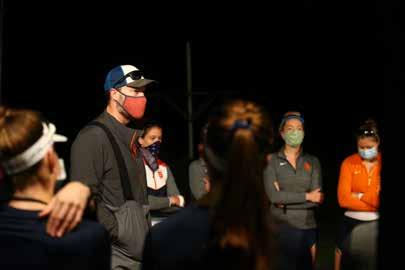
For about ten weeks, Flanagan Gym’s weights and ergs have been silent, as have the tanks in the William E. Sanford Rowing Performance Center. Women’s Rowing Head Coach Luke McGee is preparing for the women’s coxswains and oarswomen to return for classes to resume in early February, when that silence will soon give way to enthusiasm for a hoped-for on-the-water racing season.

Luke reports that the fall training was very successful in that the team did not have one positive COVID-19 test, realizing the University’s and the Athletic Department’s paramount goal of staying healthy and safe. And during the fall training, Luke reflects: “Training in pods of 10 was challenging, but we spent the ever-so-important time before and after practice to create a team environment.”
Visioning a Plan A and a backup Plan B, Coach Luke is eager to see his athletes return. Syracuse Women will have not rowed against an opponent for about 18 months when the hoped-for season starts in early April, 2021. And they will have not rowed inter-collegiately in almost 2 years. Plans A & B are dependent upon Ivy League participation, or not. Continuing recovery from the pandemic continues to plague decision making regarding the racing season. < Masked up; ^ unmasked.
Participation in the traditional early season kickoff Doc Hosea Invitational Regatta has been decided against. The SU Women will more likely race smaller venues instead, starting with the likes of Brown and Rutgers or Northeastern and Boston University to kick off their season in April.
And the pandemic has also challenged families and especially international students with the moving targets of return dates, virus testing protocols, and travel requirements. Notwithstanding what is going on in the larger the context, “The University has been impressive, increasing testing for athletes, as well as testing the entire student body.” And the University has created their own lab to process the newly created initiatives.
When asked about precautions during spring training, Luke replies: “We certainly respect the virus, health and safety definitely come first. Outdoors in the spring, the contact tracing protocol is ‘seat ahead, seat behind.’” And adds: “Once the spring thaw hits, it will be a short calendar until racing season.”
While the racing season venues and opponents are in flux, preparations for the women’s return to campus are not. Coach Luke plans on “… there has to be a build-in to the women’s fitness and training regimen, based upon the team’s longer-than-typical summer break length,” while remembering that the team has been off campus since two weeks before Thanksgiving.
During that short calendar span from return to campus to return to racing, Luke is seeking to “…recreate the memory for the women of what a race day looks like, what it is like to compete.” Luke envisions that there might be more seat racing this spring, not just to keep the women fresh and on their toes, but “… to ensure the boats have the right combinations across the gunwales throughout the season,” adding: “More seat racing will help keep the women razor sharp.”
From the get go on pandemic-induced recruiting changes, the coaches have adapted their recruiting strategies, in particular adding a signature ‘Coffee with ’Cuse’ effort. The assistant coaches and athletes have customized their recruiting tool, offering unique glimpses of the University, as well as “Why rowing for Syracuse Women is special.” Athletes from all over the United States, as well as all over the world are responding to the uniquely crafted appeals. A firstin-family college student is under consideration, an indication of the success of the new initiative. And Luke acknowledges that “… changes to the recruiting process will be on-going.”
What keeps Luke awake at night is anxiety of how to continue to provide the best on-campus experience for his charges, which “… Includes the rowing - training and racing - components, as well as the academics.” He adds: “The biggest challenge is that it is really hard to do all of that in the face of the pandemic,” and: “We have to keep it all positive.”

Over the winter break, Luke feels that the women’s leadership council has been on board with the health and safety requirements, as well as with the coaches’ encouragement for independent training to prepare the team for the spring. It is easy to envision Luke’s mantras: “Access to equipment, ergs, weights, cross training, train effectively…”
Luke acknowledges that the pandemic has been challenging for the coaches and athletes alike, all having to adapt to Zoom and other on-line connections. Upon departure at the conclusion of the fall, the coaches encouraged the women to consider their venues, equipment and training regimens, as well as how to balance their own time. Per the NCAA, coaches were precluded from direct follow up. “We will find out [the first week of practice] how independent training went.”
Looking back, Luke reflects, “Imagine a Zoom call in March of 2020 to inform the team that their season was cancelled.” One year of competitive rowing was lost, and the world has changed dramatically in the interim.
Looking ahead, Luke believes that the return to campus and training will demonstrate the women’s commitment to rowing. The fifth-years, “… are making significant decisions to return to campus, and are demonstrating the importance of rowing to each of them.” Having a racing season will communicate that a new normal was achieved successfully.
About putting on their racing uniforms, and heading to the race courses? Apparently the women will be ready for another go at it, per Luke: “The women’s urge to compete will be there. Spirits will be high!”
“It will be very emotional to launch that first set of shells towards the starting lines.”
– The Orange Oar Editor.
Images for this article courtesy SU Athletic Department. < Port oars preparing for the catch.
